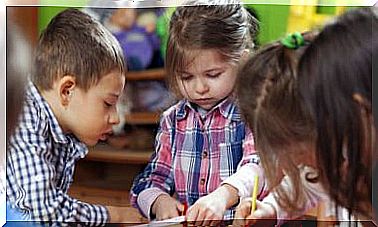Adolescent Gambling: Possible Consequences

Some experts already speak of adolescent gambling as a social plague. The term may seem like a bit of a stretch, but there is no doubt that this problem, which has always existed, is gaining in prevalence. Internet makes the game more accessible and also more elusive to the first mechanisms of social control.
When we talk about gambling, we are referring to the term pathological gambling. That is, we are talking about those situations in which gambling, gambling and similar practices make the person dependent and, therefore, begin to threaten their quality of life and that of the people around them.

Gambling today
Today, with the appearance of the internet and new technologies, access to games of chance, such as poker or casino roulette, is simple. You don’t have to go anywhere, the site is also open 24 hours a day.
Today’s youth are what are considered digital natives. In other words, they have grown up in an environment in which technology and the internet form an important part of the everyday landscape.
Among the many options, children have enjoyed simple access to online slots , slot machines, and online casino, gambling and gambling games without the need for adult supervision.
The facts
There are two different factors, but at the same time closely related to each other: they are chance and betting. On the other hand, we find ourselves with the lack of opportunities, the absence of a stable home or the current impulsiveness, in which in terms of leisure we have a huge number of options without having to wait.
On a psychological level, the young person can see in the game the possibility of taking a drastic and positive turn in his life. But first you have to risk, in this case, money.
Added to this is the type of game: many of them are surrounded by secondary stimuli that are easy to associate, such as sound or lights, which enhance the addictive factor. It is about reclaiming the impulsiveness of the potential player and encouraging him to put the calculation of probabilities aside.
To these factors we can add others that also pave the way for gambling. They are as follows:
- Conflicting personality.
- Lack of resources.
- Genetics or acquired custom.
- Gambling parents.
- Family communication problems.
- Dysfunctional families.
- Social problems.
- Lack of assertiveness.
- Poor social skills
- Connection 24 hours a day to the internet.
- Lack of filters in content for minors.
- Lack of limits on the part of parents.
- Nomophobia or pathological dependence on mobile phones.
The consequences
What are the consequences of adolescent gambling among our young people? They are many and varied that, once detected, are also used as a diagnosis to know if they suffer from this problem. Let’s see.
Habitual lies
The youngster needs to cover up the game when it becomes a problem. He also needs resources and he knows that no one is going to give them to him if he confesses that he is going to use them for that purpose.
Thus, he will begin to lie about where he is and what he is doing, but he will also begin to ask for more money, also lying about the destination of that money. Lastly, with people who know you gamble, you are also likely to start lying about how much money you lose.
Using the game with avoidance
The game can be a way out of a complicated reality. The adolescent finds in gambling a terrain in which he is not criticized and that in principle does not pose great problems for him; on the contrary, it manages to capture their full attention.
Inability to stop
The adolescent who falls victim to gambling is not able to quit gambling. In fact, in his lucid moments he is aware that what he does does not benefit him. On the other hand, he continues to see gambling as a plausible alternative to recover all that he has already lost. In many cases, your goal is no longer winning and is getting back to where you started.
Anguish
The adolescent ends up suffering from heightened anguish and enormous concern. It may be due to negative experiences, such as losing large sums of money, but also as an advance, because you know that the consequences of your activity are going to be negative.
Feeling of revenge
The more you lose, the more you want to keep playing to get back what you lost. It is a very clear sign of gambling, since for a long time he tries to equalize his finances, and it shows that he has lost a huge amount of money, causing him to return to gambling again and again.
Relational risk
The need to play ends up changing the adolescent’s bonds. As the addiction increases, more often than not, he becomes more and more self-contained or associates only with people who have the same addiction as him. In this way, their circle of support is usually very impoverished, only the closest relatives resisting in it.

Other negative consequences
Let’s see, finally, other of the usual consequences that are observed in the profiles of adolescent gamblers:
- Request for money : the young man loses his modesty and shame, giving way to daring, since he is haunted by debts.
- Violation of trust : the youngster betrays family or friends, taking the money in any way and denying having done it or lying if he is questioned about whether he played or not.
Remember that, in the case of adolescent gambling, these are possible consequences. That is, all, one or more may be present. Be that as it may, they all constitute that indicator or clue that should lead us to the consultation of a professional.









